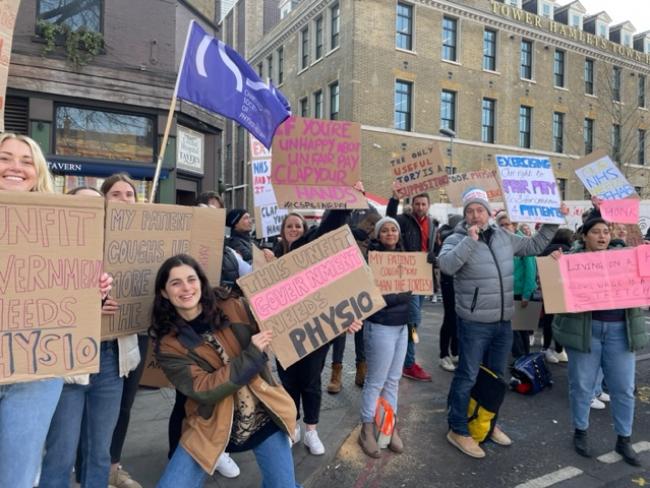14 August 2025

Physiotherapists demonstrating for better pay, Royal London Hospital, Whitechapel, February 2023. They now have a fight to find work too. Photo Workers.
Despite staff shortages newly qualified medical professionals in all disciplines are finding it difficult to get jobs. This wasteful situation has a direct impact on patient care in the NHS.
As newly graduated health professionals celebrate their achievements, their thoughts turn to finding work. There should be no difficulty. Britain is in desperate need of more doctors, nurses, physiotherapists, radiographers and many more health professionals.
‘Britain is in desperate need of more health professionals.’
Yet many NHS employers have imposed recruitment freezes. Four professional unions – The Chartered Society of Physiotherapy, the British Medical Association, the Royal College of Midwives and the Royal College of Nursing – have raised the issue.
Their joint letter to the health secretary draws attention to the situation, and demands that every health graduate who wants one is offered an NHS contract.
Unpaid overtime
A survey of student midwives by the Royal College of Midwives found that 80 per cent were not confident of finding work on graduation. Yet existing midwives and maternity support workers are working an estimated 118,000 unpaid hours of overtime each week to meet the needs of their patients.
Half the Chartered Society of Physiotherapy’s workplace reps report recruitment freezes or delays in filling physiotherapy posts. One in ten report that their trust has completely frozen recruitment of clinical staff. In 2024 physiotherapy graduates were finding it more difficult to find a job than they were two years earlier.
Below average
Britain has 3.2 doctors for every 1,000 of the population, well below the average in Europe. Yet medical posts are frozen and doctors completing foundation training are unable to find posts in specialty training or general practice.
In modern medicine imaging specialists – radiologists and radiographers – play a crucial role in prompt diagnosis before starting appropriate treatment. And 80 per cent of NHS treatment pathways rely on radiology.
Mortality risk
The Royal College of Radiologists reported in January 2025 that recruitment freezes are affecting cancer services. A month’s delay in starting cancer treatment can raise mortality risks by 10 per cent. In the first six months of 2024, over 420,000 scans took more than a month to report.
A fifth of NHS trusts across every English region and Scotland, Wales and Northern Ireland, had imposed recruitment freezes. Even in 2023 there were 1,962 fewer consultant radiologists and 185 clinical oncologists than needed.
The effect of recruitment freezes is not limited to patients and clinical professionals looking to use their new-found skills to look after patients. It drives healthcare trusts to rely increasingly on expensive locums and outsourcing.
